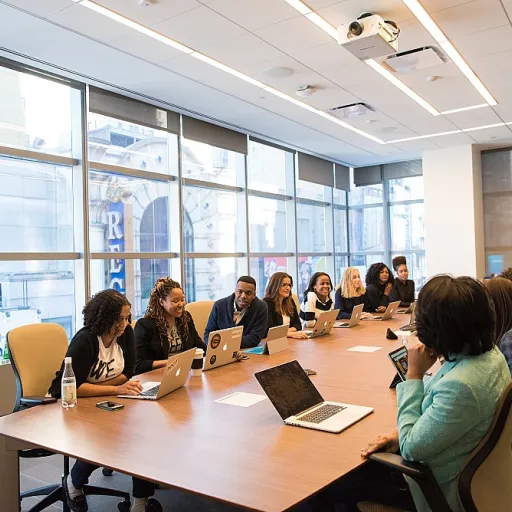
The Importance of Employee Recognition
The Power of Recognizing Achievements
In today's competitive landscape, the value of employee recognition in fostering a positive workplace culture cannot be overstated. Recognizing employees' hard work and dedication builds morale and motivates individuals and teams to continue striving for excellence. An appreciation for outstanding performance, such as celebrating the employee of the month, plays a crucial role in reinforcing an organization's commitment to excellence. Employee recognition goes beyond mere acknowledgment—it's about creating a culture of appreciation where every contribution is valued. Whether through appreciation messages, recognition rewards, or simply expressing gratitude, these gestures contribute significantly to employee engagement and overall workplace satisfaction. Recognition quotes and appreciation day celebrations are powerful tools for making employees feel appreciated and valued. Organizations that prioritize appreciation have consistently seen improvements in their workplace culture, resulting in higher team success and employee engagement levels. Incorporating regular recognition into the company ethos not only highlights the achievements of individuals but also fosters a sense of belonging within the team. Interestingly, the impact of recognizing contributions extends beyond immediate morale boosters. It helps nurture a long-term sense of loyalty and work ethic among employees. Having a structured recognition program in place ensures employees' efforts are celebrated and remembered, paving the way for continued success and dedication to the organization's mission. Successful recognition programs often blend traditional appreciation methods with innovative approaches. For instance, creative work celebrations include unique appreciation messages or cards that acknowledge work anniversaries, embracing a spirit of gratitude that strengthens team bonds. In summary, employee recognition is a cornerstone of a thriving workplace. By consistently appreciating the hard work and commitment of employees, organizations not only build a positive culture but also enhance their overall success.How Recognition Impacts Candidate Experience
The Ripple Effect of Recognition on Candidates
Recognition extends beyond enhancing employee satisfaction, reaching into the realm of candidate experience profoundly. In the realm of recruitment, the perception of existing employee appreciation can significantly influence potential candidates' views of a company. When businesses celebrate and acknowledge their employees' hard work and outstanding performance, their workplace culture becomes apparent to job seekers. A culture of appreciation can thus become a powerful tool for attracting new talent. Recognition, in this context, isn't merely about celebrating moments like work anniversaries or being named Employee of the Month. It's about cultivating an environment where employees feel valued for their ongoing contributions and dedication. This perception is crucial for candidates evaluating a company’s ethos and commitment to its team. When recognition programs are effectively implemented, they speak volumes about an organization’s priorities. They demonstrate that a company values not just its success, but also the hard work and team success that drive it. In essence, recognizing employees ties into creating a strong organizational culture where potential recruits can envision themselves growing and thriving. Positive recognition programs serve not just the current team, but help signal to prospective candidates that this is a place where appreciation and gratitude form part of the organizational DNA. It's part of what prospective employees might research before joining a company, and the recognition quotes and appreciation messages visible in public or on company platforms can be particularly persuasive. For companies looking to improve their appeal to top candidates, examining how their current employees are acknowledged is essential. By showcasing a culture of recognition and appreciation that supports both individual contributions and collective achievements, businesses can strengthen their candidate experience. Further exploration into how organizations leverage such recognition strategies can offer deeper insights here.Best Practices for Implementing Recognition Programs
Strategies for Effective Recognition Implementation
Creating a consistent and memorable recognition program requires careful planning and engagement from the entire organization. It fosters a positive workplace culture by celebrating employee success and dedication. Here are a few strategies that can help in implementing successful recognition programs:- Promote a Culture of Appreciation: Empower team leaders to consistently appreciate employee contributions. Regular acknowledgment of hard work and dedication boosts morale and strengthens team culture.
- Personalized Recognition: Recognize employees in ways that are meaningful to them. Appreciation messages and recognition quotes tailored to individual efforts can make employees feel valued and seen.
- Comprehensive Program Design: Consider incorporating a variety of elements such as recognition cards, rewards, and appreciation days to cover different facets of employee appreciation and create a more inclusive experience.
- Encourage Peer Recognition: Foster an environment where peers recognize one another's efforts. Peer appreciation not only enhances team success but also reinforces a sense of camaraderie.
- Leverage Technology: Utilize platforms that facilitate recognition across the organization, providing a transparent system for appreciating outstanding performance and contributions. Over time, this fosters engagement and highlights commitment excellence.
- Celebrate Milestones: Acknowledge work anniversaries and monthly accomplishments to keep employee recognition consistent, making each team member feel an integral part of the organization’s success.
Case Studies: Successful Recognition Programs
Learning from Experience: Real-world Recognition Programs
When implemented effectively, employee recognition programs can become a cornerstone of workplace culture, cultivating an environment where dedication and efforts are celebrated. Through the years, various organizations have successfully integrated employee appreciation into their work ethic, enhancing team success and overall employee engagement.
One common characteristic across successful recognition programs is their ability to make employees feel valued. By consistently appreciating their hard work and contributions, these programs foster a positive atmosphere that propels both personal and team success. Whether it’s monthly employee recognition programs or annual appreciation day events, these initiatives act as powerful motivators.
For instance, some companies utilize appreciation cards with personalized appreciation messages and recognition quotes to convey gratitude. Recognizing an employee of the month with tangible rewards or verbal acknowledgement can signify the organization’s commitment to excellence and reinforce the importance of individual contributions to overall success. These gestures, while simple, resonate deeply with employees.
Quotes from employees in organizations with strong recognition programs often highlight how this culture of appreciation enhances their satisfaction and loyalty. It’s not uncommon for staff members to mention how valued they feel thanks to the consistent efforts of their organization to acknowledge outstanding performance and commitment.
Moreover, organizations often employ creative ways to celebrate milestones such as work anniversaries or achievements of notable projects. Some organizations have been known to go beyond conventional recognition, integrating innovative elements that align with their distinct workplace culture.
These real-world examples emphasize the power of employee recognition initiatives in cultivating a supportive and productive work environment. They demonstrate how thoughtful implementation of these programs can significantly enhance both employee satisfaction and overall organizational success.
Challenges in Employee Recognition
Overcoming Hurdles in the Realm of Recognition
Employee recognition is a crucial component of nurturing a positive workplace culture, yet it does not come without its set of challenges. Organizations striving to acknowledge the hard work and dedication of their employees often face various obstacles in implementing effective recognition programs.
Firstly, ensuring consistency and fairness in recognition can be demanding. It is essential for companies to develop a structured program that avoids favoritism and overlooks bias, ensuring that every employee's contributions and success are equally valued and appreciated. A well-defined process helps in highlighting the outstanding performance of individuals and teams while maintaining an unbiased approach.
Another hurdle is maintaining engagement and motivation. Over time, recognition programs can become repetitive and lose their impact, causing employees to feel less appreciated. A mix of appreciation messages, employee recognition awards, and informal gestures like appreciation cards can keep the excitement alive and continually reinforce the company's commitment to recognizing excellence.
Budget constraints also pose a challenge, especially for smaller organizations. Recognition rewards and employee appreciation events require resources, and not every company may have the financial flexibility to implement them as desired. Creative solutions, such as recognition quotes or celebrating an employee's work anniversary with personalized gestures, can provide inexpensive yet meaningful alternatives.
Lastly, aligning recognition with organizational goals is vital. Recognition should not only appreciate personal achievement but also encourage a culture of team success and contributions that drive the company's objectives forward. Encouraging a shared sense of purpose ensures that employee efforts are in sync with the organization's ambitions.













